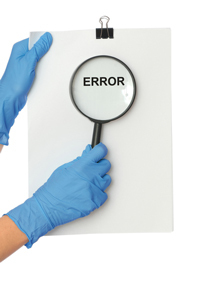As a scientist and a writer, I have a personal motto that applies to all manner of industries: You can take the scientist out of the laboratory, but you cannot take the spirit of the laboratory out of the scientist.
A laboratory is -- as a matter of practice, and as a metaphor of greater significance -- a place of intellectual discovery. It is an environment for testing experiments, reviewing results and confirming (or rejecting) a hypothesis.
Facts govern the laboratory, not big personalities or beautiful but unproven theories. The laboratory may not be immune from human error, but it is the one place where careful observation, repeated testing, and scrupulous recording of data should be employed in order to safeguard the efforts of doctors, technicians, and my fellow biochemists.
The laboratory is also at the focus of significant advancements involving technology, enhanced productivity and accountability, and the management of biological samples critical to furthering potentially lifesaving breakthroughs in the diagnosis and treatment of specific types of cancer, chronic disease, and genetic disorders.
Before I describe these changes, I would be remiss if I did not explain why these changes are so urgent.
A recent study reveals that medical errors well exceed $29 billion a year. Consider, too, this statement from Dr. Elizabeth Wagar, M.D., professor and laboratory director Department of Pathology and Laboratory Medicine University of California, Los Angeles (UCLA):
"Mislabeled specimens are usually not detected by error checking in the front end of the laboratory since the requisition and container label match."
"Mislabels are usually detected by either the caregiver, who gets a result inconsistent with clinical findings and then complains, or by delta checking in the laboratory."
"Many cases of [mislabeled specimens] go undetected. For example, when labels are completely swapped between two patients who both have values in the reference range, error detection is unlikely."
These problems are, unfortunately, not exclusive to one or a few laboratories at home or abroad. The struggle to effectively manage sample identifying information and chain of custody is a challenge faced by small and large labs alike.
The good news is this -- through a combination of software development, with an emphasis on bioinformatics and clinical research, and a team of professionals qualified to manage system integration for life science companies, there is a way to meet these challenges and reduce the frequency of mistakes in the lab.
For example: The rapid deployment of an easy-to-use laboratory information system that integrates into a laboratory's own workflow, ensures the flawless management of data, and guarantees regulatory compliance is a resource that can revolutionize the efficiency and reliability of a lab's existing technology and processes.
According to Steven Fuhrman, managing director and co-founder of Sampleminded, a firm that makes the above scenario possible:
"For us, mislabeled samples are just the tip of the iceberg. Misplaced samples, deviations from laboratory protocols, and sample mishandling also leads to poor sample quality which directly impacts data results. We find by implementing full sample chain of custody, along with seamless quality checks in the workflow, we are able to increase oversight, thereby significantly reducing the number of errors occurring in the lab."
By acknowledging the scope of this challenge, and thanks to the solutions available to research scientists (or "lab rats," pun intended), we can begin 2016 on a note of optimism about creating -- and strengthening -- laboratories of safety and discovery for the good of all.
